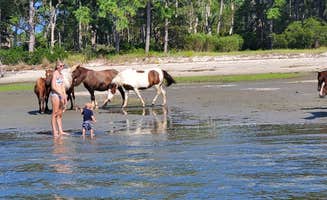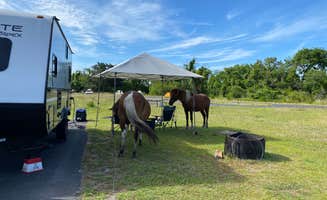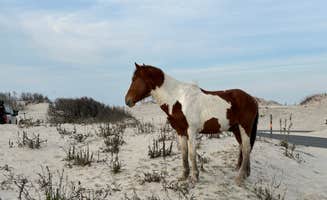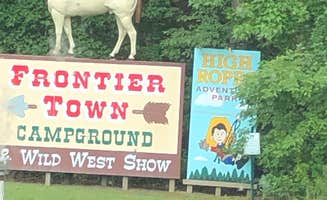Horseback riding opportunities abound near Crisfield, Maryland, where outdoor enthusiasts can explore coastal landscapes from the saddle. The Eastern Shore region features a mix of coastal wetlands, maritime forests, and sandy beaches that create diverse terrain for equestrian trails. Fall and winter months typically offer more comfortable riding conditions with fewer biting insects, while summer brings higher humidity and more mosquito activity.
What to do
Beach riding on Assateague Island: The national seashore offers designated horse camping areas with trailer parking from October through April. "The island is a magical place for those of us who like their beaches wild—there is zero development on the island," notes Rita M. about Assateague Island National Seashore Oceanside Campground.
Kayak through cypress trees: Paddling opportunities near equestrian sites provide excellent wildlife viewing. "If you like kayaking, this is a great campground to stay at. My husband and son kayaked from the campground over to a lovely sand bar off of Assateague Island. They got within very close range of a herd of ponies grazing at low tide," writes Rita M.
Crabbing from piers: Several campgrounds offer fishing and crabbing access within walking distance of horse camping areas. "We loved being able to walk right over to the pier early in the morning and enjoy the sunrise," reports a camper at Tom's Cove Park.
Wildlife observation: The EA Vaughn Wildlife Management Area provides primitive horse camping with access to numerous wildlife viewing opportunities. "Lots of trails. Pretty busy with Hunters during the season," notes Wayne L. about the EA Vaughn Wildlife Management Area.
What campers like
Direct water access: Campsites with proximity to water allow for convenient riding and horse watering. "Access to water from campground. Beautiful views. Crabbing pier," lists Rita M. as top pros of camping near the water.
Spacious campsites: Horse campers appreciate the room for trailers and equipment. "Sites are fairly spacious and have an interesting semi-circle pull through layout so backing in not required," notes Jim G. about Trap Pond State Park Campground.
Natural settings: The undeveloped landscape creates an authentic outdoor experience. "Wild horses meandering through daily. Some sites are more private than others—some not private at all, so carefully review the map and the images when booking," advises Danielle at Assateague Island Oceanside.
Evening quiet: Despite busy days, most campgrounds maintain peaceful evenings. "After dark, the camp was pretty quiet. No problems with my neighbors making noise or anything," reports Dan G. about Sun Outdoors Frontier Town.
What you should know
Seasonal considerations: Horse camping near Crisfield operates primarily during cooler months. "We always go during the winter or early spring months to avoid the bugs as they are awful during the spring and summer," warns Torie M.
Bug preparation: Mosquitoes and biting flies can be intense, particularly in summer. "Bring bug spray, tiki torches, and mosquito fog spray with all the sitting water around the campground," recommends Greg S. at Tall Pines / Chesapeake Bay KOA Holiday.
Horse behavior management: Wild ponies near camping areas may approach for food. "A small herd of them (around 8) decided to hangout in our campsite waiting for their meal. This meant we couldn't get ours. As soon as any food would come into 'nose-shot,' they would start advancing on us," reports Wendy W.
Limited amenities: Most horse camping areas provide basic facilities only. "No electric hookup or water which is expected for winter camping, we managed without for the night," shares Deanna G. about bayside camping.
Tips for camping with families
Trailer parking strategy: Position trailers to create windbreaks in open areas. "Tall Pines is a large campground with a lot of nice amenities. One of the really nice points about this CG is that they cater to short termers as well as seasonal," notes MickandKarla W.
Wildlife education: Prepare children for appropriate horse interaction. "The Ponies are giant trash pandas. They're smart and can open latches so do bring bungee cords, kayak straps, or ratchet straps to lock all of your food in cases or coolers," advises Tony P.
Off-season timing: School breaks in fall and spring offer better conditions for families with horses. "We stayed a few weeks before Halloween and there were plenty of festive activities going on," shares Garrett B.
Rental options: Some campgrounds offer cabins near equestrian areas. "We stayed in site 411 for five nights. The pull-through sites are long and nicely spaced. It's unnecessary, but rent a golf cart to get around the huge campground; it's great for going from your site to the pool, arcade, beach, or fishing pier," suggests Greg S.
Tips from RVers
Extended hookups: Bring extra water and electric connections for horse camping areas. "Sites have 30A electric and water with a nearby convenient dump station," notes Jim G. about accommodations at Trap Pond.
Leveling challenges: Prepare for uneven terrain at some sites. "They are not level and have a sandy base so it took a bit of work to finally get the rig level, even with auto-levelers," warns Jim G.
Site selection for larger rigs: Research specific sites that accommodate horse trailers plus RVs. "We had requested site 50, back-in with FHUs but were told since the park was fairly empty, we could take a golf cart and go choose a site," shares MickandKarla W., highlighting the flexibility available during off-peak times.
Wind exposure: Secure awnings and exterior equipment in coastal camping areas. "It is really neat to be able to camp right on the sand dunes and by the beach but prepare for lots of wind. Check the weather a lot because the storms roll in quickly," cautions Tori V.





